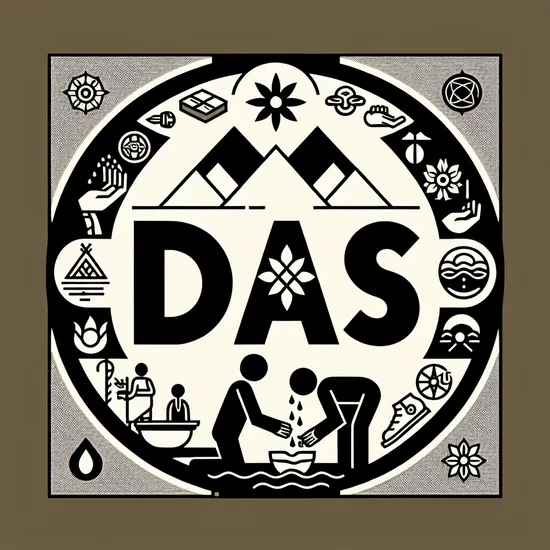Das - Explore Its Meaning, Origin, and Cultural Impact
Meaning of the Name Das
The name Das carries a profound sense of servitude or being a faithful follower. In many cultural settings, the name signifies a commitment to serving a higher purpose or cause. Often associated with spiritual and religious devotion, Das embodies humility and generosity. The symbolism attached to the name offers a relatable and enduring essence emphasized in its spiritual context.
Find more names related to the name Das.
Devotion,
Humility,
Loyalty,
Indian,
Sanskrit,
Pronunciation Guide for दास in Sanskrit
/dɑːs/ - दास
- /d/: pronounced as 'd' in 'dog'
- /ɑː/: a long 'a' sound, like 'ah'
- /s/: as 's' in 'see'
The name 'Das' is pronounced as 'dahs,' with a broad 'a' as in 'father.'
Origin of the Name Das
The origin of the name Das is deeply rooted in the Indian subcontinent. Deriving from Sanskrit, it traditionally denotes 'servant' or 'devotee,' especially in a religious context. The cultural heritage of this name is significant within Hindu families, often signifying a lifelong bond with the divine. The name maintains its respect and relevance across generations due to its spiritual implications.
Gender Neutrality of Das
The name Das is remarkably gender-neutral, making it suitable for both males and females. In countries like India and Nepal, it is frequently used across genders, reflecting its universal appeal. Esteemed figures such as Das Gupta and others exemplify its cross-gender usage. Its acceptance as a gender-neutral name demonstrates a broad and inclusive approach to naming.
Popularity of Das
Globally, Das enjoys moderate popularity, with a particular prominence in India where it is historically significant. Over time, the name has maintained stable usage, rooted largely in its cultural ties. Despite global exposure, it remains most popular in regions with strong Indian cultural influence, upholding a consistent position in baby name charts within such communities.
Global Usage of Das
The name Das is cherished across different cultures, notably in India and the Indian Diaspora. In regions like Southeast Asia and Fiji, the pronunciation may vary slightly, but its religious significance endures. Globally, the name maintains an image of humility and spirituality, resonating with diverse cultural identities due to its historical and religious foundations.
| Global Distribution and Gender Ratio of the Name Das |
| Country |
Usage % |
Female % |
Male % |
| BR |
70.89% |
73.21% |
26.79% |
| US |
4.11% |
19.23% |
80.77% |
| ID |
3.01% |
15.79% |
84.21% |
| TR |
3.01% |
15.79% |
84.21% |
| DE |
2.22% |
42.86% |
57.14% |
Nation-based analysis of name gender and popularity relies on data from
Gender API.
Characteristic Traits Associated with Das
- Humility : A profound quality of selflessness and unpretentiousness associated with individuals named Das.
- Devotion : Strong religious or spiritual commitment is often observed.
- Generosity : Recognized for kindness and willingness to help others.
- Loyalty : Exemplifies steadfastness in relations and commitments.
Professional Inclinations of Individuals Named Das
- Spiritual Leader : Many find roles in religious or spiritual guidance.
- Teacher/Educator : Inclination towards sharing knowledge and teaching.
- Philanthropist : Passion for charitable activities is common.
- Social Worker : Engagement in societal betterment projects.
Unique Aspects of the Name Das
- Historical Roots : The name features prominently in ancient Sanskrit texts and scriptures.
- Cultural Reference : Frequently appears in Indian movies and television dramas, reinforcing societal values.
- Artistic Connection : Artists like Satish Das have spread its appeal beyond borders.
- Science Influence : The esteemed mathematician D. Clay has lent intellectual prominence to the name.
Notable Personalities Named Das
- Sudhir Das: Renowned Indian actor known for his work in regional cinema.
- Rajashree Das: Acclaimed author with numerous publications in fiction.
- Soumen Das: Esteemed academician and researcher in herpetology.
Similar Names
-
Dasa: Often similar in sound, meaning servant in a spiritual context.
-
Dasi: A feminine form indicating servant, closely associated with religious devotion.
-
Dasharath: Means ten chariots and significantly found in Sanskrit narratives.
-
Daman: Means controller or someone who subdues, fitting both genders in cultural stories.
-
Darsha: Signifies sight or vision, often used in spiritual poems.
-
Dana: Means generosity, widely accepted in varied cultures for both genders.
-
Daksha: Refers to capable or skillful, with roots in ancient Hindu texts.
-
Daljit: Symbolizes victory or a conquering hero, often gender-neutral.
-
Darpan: Means mirror or reflection, a name transcending cultural boundaries.
-
Darla: Indicates dearling or beloved, a familiar name in contexts beyond Western culture.
